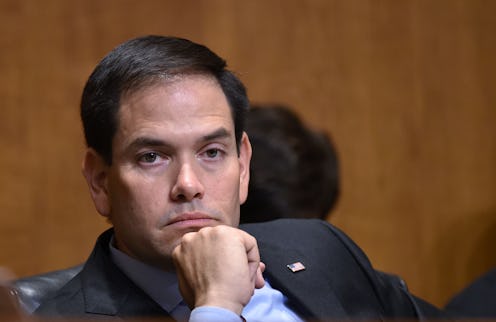Tuesday's congressional primaries in Florida and Arizona may not seem as riveting as the upcoming general election, but they still mark an incredibly important moment for this election cycle. Voters in both states headed to the polls to shape the next Congress as Republican Sens. Marco Rubio and John McCain tried to hold on to their respective Senate seats and former Democratic National Committee Chairwoman Debbie Wasserman Schultz received a challenge from Tim Canova. In Florida, the congressional primaries have especially high stakes, and they happen to be accompanied by a healthy dose of controversy too.
Last year, the Florida Supreme Court approved a congressional map that altered all but three of the state's 27 congressional districts. The impact of this decision is already evident, as congressional races all over Florida work to shift the balance of both the House and Senate. After missing out on the Republican Party's presidential nomination, Rubio faced a challenge from a wealthy businessman named Carlos Beruff, who has resolutely endorsed Republican nominee Donald Trump. But Rubio seems to have known that his chances of victory against Beruff are high, because the incumbent senator already set his sights on attacking his possible Democratic opponents, Patrick Murphy and Alan Grayson. And he was right to do so, because he did, in fact, win Florida's Republican primary.
But Murphy and Grayson were not the only ones running for the Senate seat in the Democratic primary, even though Rubio and Murphy had primarily focused their attacks on each other and ignoring the other candidates. There was also Pam Keith, a former judge advocate in the Navy. The Miami Herald endorsed Keith in the Democratic primary, but Keith had largely been overlooked by party leaders and voters alike. Update: Murphy won the race, with Grayson and Keith coming in a very distant second and third, respectively.
Because he has been running for senator, Grayson — a current Representative — will soon vacate his seat south of Orlando, in Florida's 9th congressional district. The race to fill that seat is perhaps the most bizarre: Among the four Democratic candidates vying for the position are Grayson's wife and his former district manager. Update: The Democratic primary was ultimately won by Florida state Sen. Darren Soto; he will face the Republican candidate, businessman Wayne Liebnitzky, in the general election.
Despite all of the different controversies that have come to light during these primaries, Wasserman Schultz has not been able to escape the spotlight. She successfully defended her seat from Canova, a Nova Southeastern University professor who was endorsed by Sanders following the DNC's treatment of him during his presidential bid.
Why do all of these primary races in Florida matter so much? For one thing, 17 of Florida's 27 representatives are currently Republicans, but if Democrats manage to take all four of the competitive seats on the state's congressional delegation in November, they could even out the numbers to 14 Republicans and 13 Democrats. Plus, a significant amount of money has gone into the Florida races — outside groups have invested almost $6.5 million in opposing or supporting congressional candidates, according to the Federal Election Commission — making the stakes even higher.
You might think that shaking up a few seats in Florida wouldn't have such a dramatic impact on how the Senate and the House ultimately turn out, but the state has actually been an important center for political action during this election as well as previous ones. Susan MacManus, a state politics expert at the University of South Florida, made this clear in an interview with The New York Times when she illustrated the connections between the Florida congressional primaries and the presidential election.
For the first time, every single congressional district is competitive. What haven't we seen in Florida this year? That's the question. A lot of people think that this is the place where the Senate is won or lost. Many think that is why Hillary spends so much time here — not so much because she is worried about Florida, but because they desperately want to change that Senate seat.
These stakes, coupled with the new congressional map, mean that voters in Florida have been presented with an opportunity to tip the balance one way or another. November is rapidly approaching, and the outcome of the congressional races is going to be just as important as the results of the presidential election — if not more so.
